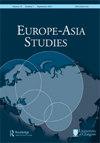话语实践在公共外交和国际关系中的作用:以俄日关系为例
IF 1.2
3区 社会学
Q1 AREA STUDIES
引用次数: 0
摘要
本文章由计算机程序翻译,如有差异,请以英文原文为准。
The Role of Discursive Practices in Public Diplomacy and International Relations: The Case of Russia–Japan Relations
Abstract Utilising discourse analysis to evaluate Russian President Vladimir Putin and Foreign Affairs Minister Sergei Lavrov’s public speeches as part of public diplomacy, this study deconstructs the discursive practices of Russian political elites in Russia–Japan relations. The data analysis demonstrates that, when speaking from a position of power, Putin and Lavrov delegitimise Japan’s political decision-making sovereignty and the role of the Japanese public in the negotiation process. This article argues that even though the discursive practices of Russian political elites are oriented towards a foreign public, the impact on their domestic legitimacy is greater.
求助全文
通过发布文献求助,成功后即可免费获取论文全文。
去求助
来源期刊

Europe-Asia Studies
Multiple-
CiteScore
2.60
自引率
7.10%
发文量
152
期刊介绍:
Europe-Asia Studies is the principal academic journal in the world focusing on the history and current political, social and economic affairs of the countries of the former "communist bloc" of the Soviet Union, Eastern Europe and Asia. At the same time, the journal explores the economic, political and social transformation of these countries and the changing character of their relationships with the rest of Europe and Asia. From its first publication in 1949, until January 1993, the title of Europe-Asia Studies was Soviet Studies. The Editors" decision to change the title to Europe-Asia Studies followed the collapse of the Soviet Union at the end of 1991.
 求助内容:
求助内容: 应助结果提醒方式:
应助结果提醒方式:


